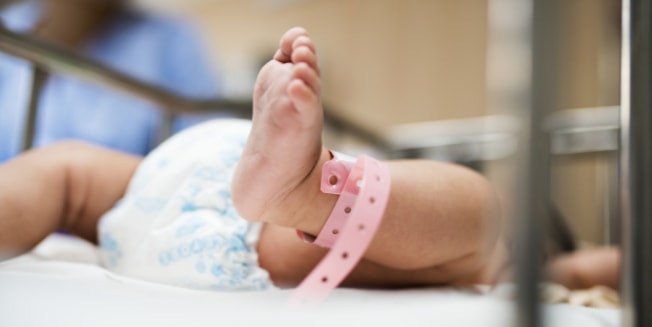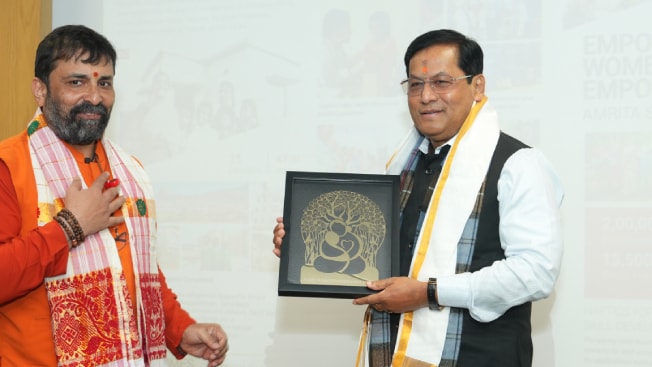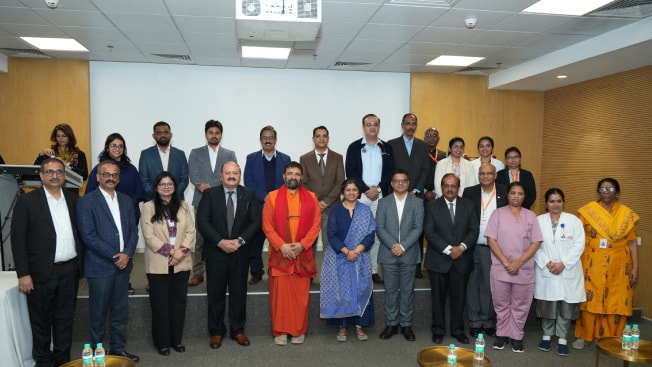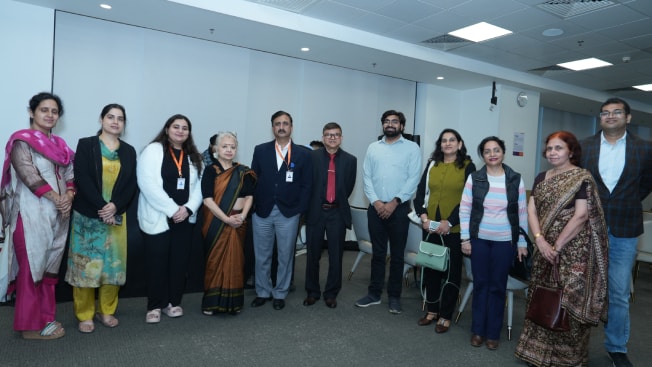
In a remarkable life-saving feat, doctors at Amrita Hospital, Faridabad, conducted an arterial switch operation on two newborns, a girl aged 7 days and a boy aged 23 days, suffering from a serious and rare congenital heart defect called transposition of the great arteries (TGA). The complex, six-hour surgery was carried out by a team of specialists, who successfully treated the condition and gave the gift of a healthy life to the infants.
In Transposition of the Great Arteries, the placement of two main arteries that carry blood from the heart – the main pulmonary artery and the aorta – changes their position (get "transposed"). If left untreated, this leads to death.
Said Dr. Ashish Katewa, Head of the Department of Paediatric & Congenital Heart Surgery at Amrita Hospital, Faridabad: "The diagnosis of TGA is like a death warrant, and 90% of these children do not survive beyond the first year of life. On the other hand, if timely surgery is performed, more than 95% of these children are expected to lead a normal life. It is a technically challenging operation that does not leave any room for mistakes."
Talking about the challenges, Dr. Katewa added, "The surgery typically takes 5 to 6 hours. The most challenging part of the operation is to remove the tiny coronary arteries and suture them to the neo-aorta. These arteries measure only 2mm, and any imperfection can impact short- and long-term outcomes. Once the connections are made, the baby is disconnected from the heart-and-lung machine."
The 23-day-old male infant, named Amrit, was born to a mother who had already lost three babies during pregnancy. This was her first live birth. The other infant, a 7-day-old girl named Amrita, was also the first child of her parents. She was brought to the hospital in an ambulance while on respiratory support and life-saving drugs.
Talking about how the transposition of the great arteries is treated, Dr. Sushil Azad, Deputy Head & Principal Consultant, Paediatric Cardiology & Adult Congenital Heart Disease at Amrita Hospital, Faridabad, said: "Upon arrival of the tiny patients, the cardiologist performs an ultrasound of the heart, confirms the diagnosis, and provides all the necessary information for surgery. Occasionally, a hole may be made between the heart's upper chambers to improve the oxygen level before surgery."
Dr. Katewa also explained, "The surgical team approaches the baby's heart through a chest incision, and a heart-lung machine is necessary to perform the operation. The baby's heart is then connected to this machine. The perfusionist takes over the function of the heart and lungs using this machine and keeps the baby alive while the surgeon operates. The abnormally connected pulmonary artery and aorta are then cut and reconnected to their normal positions, allowing red blood to flow into the body and blue blood to flow to the lungs, as it should."
Dr. Junaid Bhat, Paediatric Cardiac Anaesthesiologist, Amrita Hospital, Faridabad, said: "The anesthesiologist plays a crucial role in keeping the baby safe and stable during the surgery. They are responsible for securing the airway and various monitoring lines. After the surgery, the chest is closed and the baby is moved to the ICU for recovery. An expert team of intensivists, cardiac nurses, physiotherapists, and dieticians takes care of the infant during their stay in the ICU, which typically lasts for 4 to 5 days. After that, the baby is moved to the post-operative ward. The mother is encouraged to participate in the care process to ensure a smooth transition from the hospital to home."
The surgery was successful for both infants. Despite his initial weight of only 2.3 kg and complications with viral pneumonia during post-operative recovery, the boy has made an excellent recovery and currently weighs 4.5 kg. He spent four weeks in the intensive care unit. On the other hand, the 7-day-old girl's post-operative recovery was excellent, and she was discharged after a week of surgery.
Said the boy’s father: "We were devastated when my wife had already suffered from three miscarriages or stillbirths and we heard about my newborn son's illness. I took him to various hospitals in many cities but faced only disappointment. The doctors there told us that my son was in a critical condition and even after surgery, the outcome was uncertain. I am very thankful to the doctors of Amrita Hospital for successfully conducting such a complex surgery, giving him a new lease of life."
Said the girl’s mother: "My daughter is our first child. I was extremely concerned about her having such a severe heart condition at birth and was anxious about her survival. The doctors at Amrita Hospital have been genuine lifesavers. Now, I am eager to see my daughter grow up like any other healthy child."
The families named their babies after Amrita Hospital to express their gratitude.
A paediatric cardiac team comprising many specialists including cardiology, cardiac surgery, cardiac anaesthesia, perfusionists, intensivists, scrub nurses, ICU nurses, and neonatologists, provided their dedicated service.
Three more arterial switch operations have been successfully performed in a span of two months after the first two successful surgeries. These surgeries were partially funded by Amrita Hospital, Faridabad.


